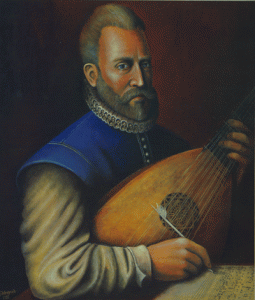Dowland, Now, O Now, I Needs Must Part

“Semper Dowland, semper dolens” (always Dowland, always doleful). The motto comes from Dowland himself. Melancholia is what made John Dowland (1563-1626) famous. Songs like “Flow My Tears” and “I Saw My Lady Weep” seem to sum up Dowland’s output, although not all his songs reach such emotional depths. So what makes Dowland’s sad lute songs so appealing, in his own time and extending to today?
Part of the answer lies in the power of music to express sorrow, and in doing so to redeem it in some way. It is true of other arts as well—tragic plays, poetry—but those tend to carry more concrete meaning. Music, being more abstract, is more adaptable to your own circumstance. It expresses things that are beyond your own powers of expression.
And let’s not forget that melancholy was all the rage in Dowland’s time. Dowland gave his audiences what they clamored for.
Many lute songs, of course, fall on the opposite side of the sale, expressing joy and humor. So I think the biggest factor in their popularity has much to do with their simplicity and directness. The lute song established the genre of solo song—still very much with us. In fact, Dowland and many of his contemporaries were the singer/songwriters of their day. They composed, sang, and accompanied themselves on lute.
The part song was often a solo song subsequently arranged for multiple singers, usually soprano, alto, tenor, and bass. Now, O Now appears in Dowland’s First Booke of Songes or Ayres of foure partes with Tableture for the Lute published in 1597. Notice that the singers read from the same sheet of music arranged purposefully to be read by singers (and lutenist) seated around a table. You can see the printed page here.
The tune appeared earlier (1590) in a collection of solo lute pieces under the title “Frog Galliard.”



